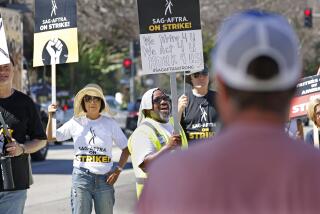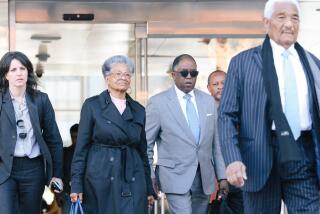Teamster’s Way to Prison Cleared : High Court Won’t Hear Appeal by Ex-President Williams
- Share via
WASHINGTON — The Supreme Court today cleared the way for the imprisonment of former Teamsters union chief Roy L. Williams and two others for conspiring to bribe former Sen. Howard W. Cannon (D-Nev.).
The court, without comment, refused to hear arguments that federal prosecutors unlawfully used FBI wiretap evidence in the case.
The court also rejected an appeal by a fourth defendant in the case, underworld figure Joseph Lombardo, 56. He was sentenced to 15 years and is already in prison.
Williams, who will be 70 on March 22, was sentenced to 55 years in prison. Andrew G. Massa, a former trustee of the union’s Central States Pension Fund, was sentenced to a year and a day, and former trustee Thomas F. O’Malley received a 2 1/2-year sentence.
Fined $29,000
Williams and Lombardo each were fined $29,000 as well, and Williams was forced to give up his Teamsters position.
FBI agents made more than 2,000 reels of court-authorized tape recordings over a 14-month period.
The four defendants were convicted Dec. 15, 1982, of scheming to offer a bribe to Cannon in return for his help in trying to defeat a trucking deregulation bill.
Cannon was not implicated in any wrongdoing in the case, and the bill later became law.
Another convicted conspirator, Teamster pension fund consultant Allen M. Dorfman, was shot to death in gangland style in a suburban Chicago restaurant parking lot in January, 1983.
Wiretaps Challenged
Lawyers for the four defendants said their clients’ privacy rights were violated because of the extensive nature of the wiretaps.
They said that the wiretaps were in place for three months before federal authorities in early 1979 began to suspect a bribery attempt.
The appeals said the wiretaps were installed on Dorfman’s office phones because the authorities were investigating possible hidden ownerships in Nevada casinos.
The U.S. 7th Circuit Court of Appeals ruled last June that the government’s use of the wiretaps had been lawful.
In other cases, the court:
--Asked the Reagan Administration to give its view of whether states may help meet the cost of cleaning up hazardous chemicals by taxing the same chemical and oil companies that contribute to the federal Superfund program.
--Refused to expand its study of whether airlines may force flight engineers to retire at age 60 in the interest of safety.
--Let stand a ruling that it was not a violation of any constitutional rights to fire an Ohio high school guidance counselor who said she was bisexual.
More to Read
Sign up for Essential California
The most important California stories and recommendations in your inbox every morning.
You may occasionally receive promotional content from the Los Angeles Times.













